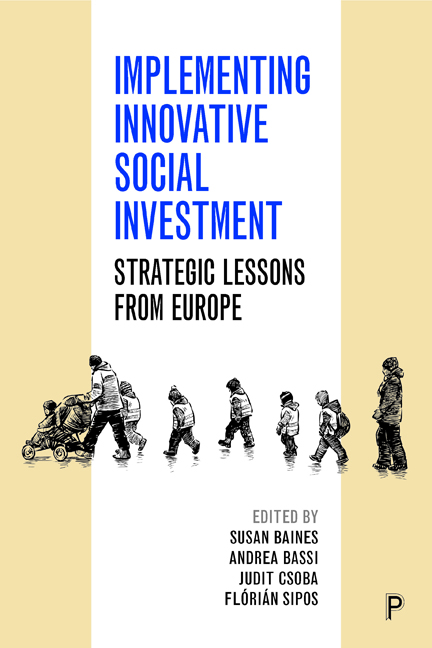Book contents
- Frontmatter
- Contents
- List of tables, figures, images and boxes
- Notes on contributors
- Acknowledgement
- one Social Investment in welfare: a sub-national perspective
- Part A Children and families: early intervention in people’s life courses
- Part B From a caring state to an investing state: labour market activation
- Part C Social solidarity and Social Investment
- Index
eleven - Social Investment and the causes of energy poverty: are cooperatives a solution?
Published online by Cambridge University Press: 21 April 2022
- Frontmatter
- Contents
- List of tables, figures, images and boxes
- Notes on contributors
- Acknowledgement
- one Social Investment in welfare: a sub-national perspective
- Part A Children and families: early intervention in people’s life courses
- Part B From a caring state to an investing state: labour market activation
- Part C Social solidarity and Social Investment
- Index
Summary
Introduction
This case study looks at the example of a local energy cooperative and its relationships with local authorities to provide a Theory of Change and sustainable solutions that might be transferred to other agents in the energy chain. The price of all commodities for households in Spain has undergone a dramatic rise, yet the price of electricity in particular, as compared to other wealthier nations, such as France or Germany, has been even more remarkable (see Figure 11.1).
An unemployment rate of around 20% has meant profound changes in Spanish households. Around 35% of under 25s not in full-time education were without work in mid-2017, which means that very few young Spanish people are able to live independently; they usually end up living with their parents and relying on them for all their basic needs, with the subsequent rise in costs for the household. The state, through a budget provided to local councils, provides benefits to people who run the risk of having their electricity supply cut off or who are liable for eviction from their property, both rented and owned. However, there is little evidence of state intervention in balancing the increasing polarisation of social well-being and crippling electricity prices (Bono, 2012). The so-called ‘bono social’ imposed on the large, controlling electric corporations, which took the form of subsidies for at-risk groups, has recently been rescinded. Not only that, but taxpayers will now be obliged to repay the estimated €188 million per year that the bono social provided to large families, pensioners and the unemployed, which consisted of a 25% reduction in their electricity bill.
The town halls in the bigger cities are beginning to launch new initiatives to attempt to tackle the root issues of energy poverty, such as poor housing conditions. Recent political swings in larger cities such as Madrid, Barcelona or Valencia have led to more of a focus on socio-economic issues despite austerity still being very much the order of the day, as well as widening gaps in the funding received by Spain's different regions. Unfortunately, the effects of the economic crisis are still fully visible and projects that look to install modern water heaters or better-insulated windows are isolated actions, due, in part, to budget restrictions as a result of austerity measures (Pavolini et al, 2015).
- Type
- Chapter
- Information
- Implementing Innovative Social InvestmentStrategic Lessons from Europe, pp. 179 - 194Publisher: Bristol University PressPrint publication year: 2019



